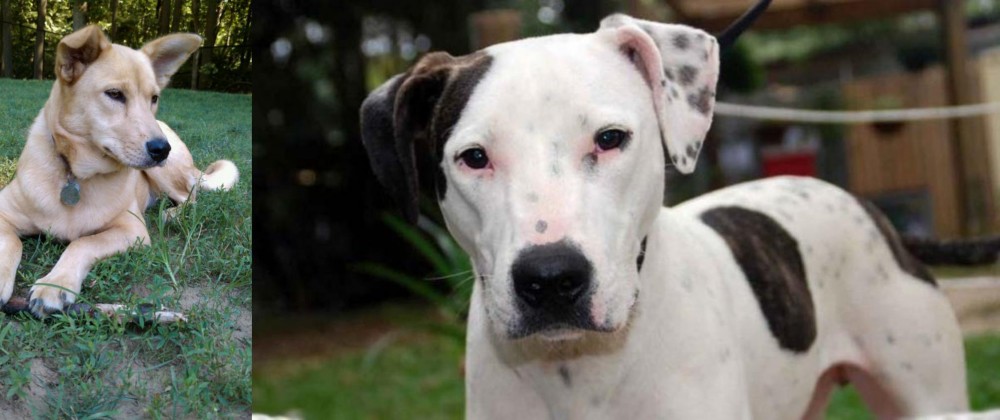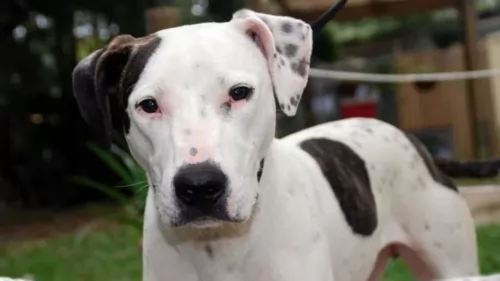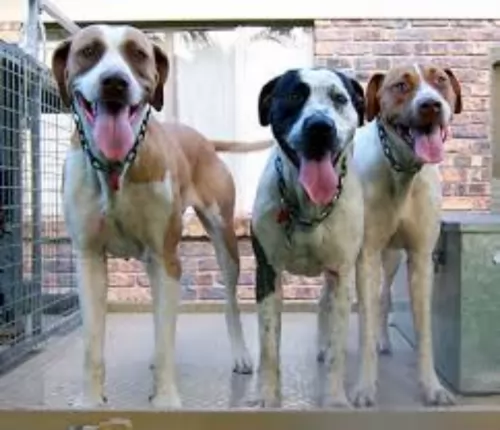 Petzlover
Petzlover Carolina Dog is originated from United States but Bull Arab is originated from Australia. Carolina Dog may grow 8 cm / 3 inches shorter than Bull Arab. Carolina Dog may weigh 30 kg / 66 pounds lesser than Bull Arab. Both Carolina Dog and Bull Arab has same life span. Carolina Dog may have less litter size than Bull Arab. Carolina Dog requires Moderate Maintenance. But Bull Arab requires Low Maintenance
Carolina Dog is originated from United States but Bull Arab is originated from Australia. Carolina Dog may grow 8 cm / 3 inches shorter than Bull Arab. Carolina Dog may weigh 30 kg / 66 pounds lesser than Bull Arab. Both Carolina Dog and Bull Arab has same life span. Carolina Dog may have less litter size than Bull Arab. Carolina Dog requires Moderate Maintenance. But Bull Arab requires Low Maintenance
 The Carolina dog comes from wild dogs that used to run with the Paleo-Indians of North America, and today they can still be found in their wild state near the Georgia-South Carolina border.
The Carolina dog comes from wild dogs that used to run with the Paleo-Indians of North America, and today they can still be found in their wild state near the Georgia-South Carolina border.
Many scientists believe that the dog was first domesticated from the wolf thousands and thousands of years ago. Today there aren’t many records on the Carolina Dog’s history and it isn’t sure how long they lived their feral lifestyle in the American South, but it seems as though it was for hundreds of years.
You could say that the modern history of the Carolina Dog started in the 1980s. Dr. Pam Brisbin found a puppy at a dump site which looked like the Australian Dingo. Dr Brisbin and other scientists concluded that the Carolina Dog was a remnant of primitive dogs. Since those times the Carolina Dog has adapted well to being a domesticated pet.
 In the 1970’s feral pig hunters wanted a dog that could be aggressive in finding and capturing the pigs. The hunters crossed the German Shorthaired Pointer, the Bull Terrier and the Greyhound to develop the Bull Arab. It is believed that the hybrid is at least 50% Bull Terrier. It is also possible that there is some Doberman, Mastiff, Great Dane and/or Pointer in the hybrid as well.
In the 1970’s feral pig hunters wanted a dog that could be aggressive in finding and capturing the pigs. The hunters crossed the German Shorthaired Pointer, the Bull Terrier and the Greyhound to develop the Bull Arab. It is believed that the hybrid is at least 50% Bull Terrier. It is also possible that there is some Doberman, Mastiff, Great Dane and/or Pointer in the hybrid as well.
The job of the Bull Arab is to hunt out the feral pigs, grab one by the ear and hold it until the hunter arrives. They have a strong sense of smell and that is how they find the pigs.
Mike Hodgens, an Australian, developed the hybrid and added some Bloodhound as well to get that ability to smell out the pigs at great distances. They are also capable of catching buffalo and cattle. Some Australians use the breed in cattle or buffalo ranching. They are registered with the DRA or Dog Registry of America, Inc.
 The Carolina dog is part of the Sighthounds Group and looks a bit like a Dingo, German Shepherd and Wolf mix. He has fairly long, pointed erect ears, a sharp wolf-like snout and a long tail that curves when raised.
The Carolina dog is part of the Sighthounds Group and looks a bit like a Dingo, German Shepherd and Wolf mix. He has fairly long, pointed erect ears, a sharp wolf-like snout and a long tail that curves when raised.
The Carolina dog has been re-discovered however and when trained and socialized, they make splendid pets. It’s a medium sized dog standing at 45–61cm and weighing from 15–20kg. He is slender, muscular and athletic with a coat that is short and fairly smooth. Colors for the Carolina dog vary and he can be fawn colored, a gingerish color, black and tan and can have some white areas on the paws, chest, muzzle and tail.
The Carolina Dog has been a wild dog, belonging to a pack and while he isn’t aggressive, he is nervous and aloof around strangers. Good training and socialization provides him with the skills to get along well with his human family as well as with children and other pets in the home.
Because this dog has always been wild, they tend to maintain some of their wild, independent nature and they can be difficult to train and it requires firmness and patience with him, but he is an intelligent breed.
 Mike Hodgens succeeded in developing a powerful, well built dog. The Bull Arab has a powerful head and muzzle. He has moderate length drop ears and bright eyes that match the color of his coat. His chest is neither shallow nor deep and his back is straight and strong. Their tails are tapered and pointed yet the base is thick. They are a double-coated dog. They can be white with black, tan or liver, flecked or bicolor.
Mike Hodgens succeeded in developing a powerful, well built dog. The Bull Arab has a powerful head and muzzle. He has moderate length drop ears and bright eyes that match the color of his coat. His chest is neither shallow nor deep and his back is straight and strong. Their tails are tapered and pointed yet the base is thick. They are a double-coated dog. They can be white with black, tan or liver, flecked or bicolor.
 The Carolina Dog is a medium-sized dog which has managed to survive well in the wild environment. It is this life in the wilds which has made the dog to be shy and aloof around strangers.
The Carolina Dog is a medium-sized dog which has managed to survive well in the wild environment. It is this life in the wilds which has made the dog to be shy and aloof around strangers.
They are skilled and intelligent and when domesticated they make extraordinary pets even though he isn’t an overly affectionate dog. It is why he requires early socialization so that he doesn’t grow up shunning humans.
With training however, the Carolina Dog becomes a well-adjusted, loving and social member of the family.
 The Bull Arab is intelligent, calm and loyal. Like Pit Bulls in the U.S., the Bull Arab has a reputation for aggression against both people and animals. There is no data to support these claims. They have been used as therapy dogs and companion animals very successfully. They are great with kids and very affectionate. The breed is cited as being used for companion and therapy animals
The Bull Arab is intelligent, calm and loyal. Like Pit Bulls in the U.S., the Bull Arab has a reputation for aggression against both people and animals. There is no data to support these claims. They have been used as therapy dogs and companion animals very successfully. They are great with kids and very affectionate. The breed is cited as being used for companion and therapy animals
 The Carolina Dog is a fairly healthy breed. You won’t have to be rushing off to the vet often with him if you look after him well in terms of a good diet, a food amount of exercise and plenty of love and attention. In fact breeders of the Carolina Dog have noted that they haven’t seen any cases of genetically inheritable diseases with this robust dog.
The Carolina Dog is a fairly healthy breed. You won’t have to be rushing off to the vet often with him if you look after him well in terms of a good diet, a food amount of exercise and plenty of love and attention. In fact breeders of the Carolina Dog have noted that they haven’t seen any cases of genetically inheritable diseases with this robust dog.
However with all dogs, no matter how healthy they are, there can be problems. Problems common to domestic dogs can include skeletal and visual problems. Many dog owners have their pets tested to identify some of the potential health defects that some dogs are prone to. This can include hip dysplasia, cataracts, cancer and PRA or Progressive Retinal Atrophy.
 The Carolina Dog is a seasonal shedder and the shortish coat will simply require a thorough brushing twice a week to keep him in tip top condition.
The Carolina Dog is a seasonal shedder and the shortish coat will simply require a thorough brushing twice a week to keep him in tip top condition.
This dog, with his upright ears, isn’t prone to ear infections as other breeds, but nonetheless as part of his grooming routine, its a good idea to to check his ears inside for wax build-up and dirt. Certainly his teeth should be brushed 2 or 3 times a week with special dog toothbrush and toothpaste. This keeps the gums and teeth healthy and also avoids other diseases that come about because of dental disease.
Whether you feed your Carolina Dog once or twice a day, you want to ensure the very best quality diet to avoid skin problems and illness. You also have to ensure your dog has 24/7 access to fresh, cool drinking water to help him with digesting his food.
There are some excellent commercially manufactured dog foods on the market which have been manufactured for certain stages of your dogs life. Add in some rice, vegetables and meat from time to time and every now and again you can give him some raw meat too.
 This is a working dog so he needs to eat the right kind of quality dog food. In order to avoid bloat do not feed large meals but rather feed one to two cups of food two to three times a day.
This is a working dog so he needs to eat the right kind of quality dog food. In order to avoid bloat do not feed large meals but rather feed one to two cups of food two to three times a day.
Hunting Accidents – this is the biggest reasons for health problems with the Bull Arab.
These are working dogs that are inactive when not working. They need a lot of exercise if they are not used for hunting. Agility, Tracking and hunting games, and field trials.